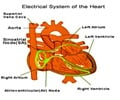A novel computer model developed by scientists predicts the risk of irregular heartbeats and sudden cardiac death.

Researchers plan on using IBM's supercomputer, the Blue Gene/Q, to develop a model of the whole human heart, the Journal of the American College of Cardiology reports.
With this study under their belts, the research team, including several scientists from the Medical Centre, the IBM T.J. Watson Research Center in Yorktown Heights, New York, and the IBM Research Collaboratory for Life Sciences in Melbourne, Australia, is pursuing a much more sophisticated model of the whole human heart.
They plan to predict the effects of new drugs on the electrical activity of the heart -- one of the most challenging hurdles in the development of new drugs and an extremely important part of keeping potentially dangerous drugs off the market, according to a Rochester statement.
The computer model, designed by IBM scientists Matthias Reumann and J. Jeremy Rice, includes 192 heart cells made to function electrically like the ventricle wall by assigning varying properties to cells based on their position -- inside, middle, or outside -- in the heart wall.
IBM scientists used canine cardiac cells as a guide, adapting the model cells to act more like ours based on extensive data on the electrical properties of the human heart. In the end, the simulation requires the solution of more than 100,000 complex mathematical equations at least 1,000 times over just to simulate a single heartbeat.
Source-IANS
 MEDINDIA
MEDINDIA



 Email
Email







